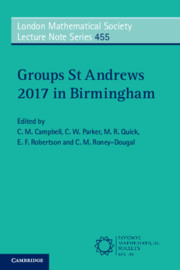Book contents
- Frontmatter
- Contents
- Introduction
- Finite Simple Groups and Fusion Systems
- Finite and Infinite Quotients of Discrete and Indiscrete Groups
- Local-Global Conjectures and Blocks of Simple Groups
- A Survey on Some Methods of Generating Finite Simple Groups
- One-Relator Groups: An Overview
- New Progress in Products of Conjugacy Classes in Finite Groups
- Aspherical Relative Presentations all Over Again
- Simple Groups, Generation and Probabilistic Methods
- Irreducible Subgroups of Simple Algebraic Groups – A Survey
- Practical Computation with Linear Groups Over Infinite Domains
- Beauville p-Groups: A Survey
- Structural Criteria in Factorised Groups Via Conjugacy Class Sizes
- Growth in Linear Algebraic Groups and Permutation Groups: Towards a Unified Perspective
- L2-Betti Numbers and their Analogues in Positive Characteristic
- On the Pronormality of Subgroups of Odd Index in Finite Simple Groups
- Vertex Stabilizers of Graphs with Primitive Automorphism Groups and a Strong Version of the Sims Conjecture
- On the Character Degrees of a Sylow p-Subgroup of a Finite Chevalley Group G(pf) Over a Bad Prime
- Patterns on Symmetric Riemann Surfaces
- Subgroups of Twisted Wreath Products
- Some Remarks on Self-Dual Codes Invariant Under Almost Simple Permutation Groups
- Test Elements: From Pro-p to Discrete Groups
- References
Finite and Infinite Quotients of Discrete and Indiscrete Groups
Published online by Cambridge University Press: 15 April 2019
- Frontmatter
- Contents
- Introduction
- Finite Simple Groups and Fusion Systems
- Finite and Infinite Quotients of Discrete and Indiscrete Groups
- Local-Global Conjectures and Blocks of Simple Groups
- A Survey on Some Methods of Generating Finite Simple Groups
- One-Relator Groups: An Overview
- New Progress in Products of Conjugacy Classes in Finite Groups
- Aspherical Relative Presentations all Over Again
- Simple Groups, Generation and Probabilistic Methods
- Irreducible Subgroups of Simple Algebraic Groups – A Survey
- Practical Computation with Linear Groups Over Infinite Domains
- Beauville p-Groups: A Survey
- Structural Criteria in Factorised Groups Via Conjugacy Class Sizes
- Growth in Linear Algebraic Groups and Permutation Groups: Towards a Unified Perspective
- L2-Betti Numbers and their Analogues in Positive Characteristic
- On the Pronormality of Subgroups of Odd Index in Finite Simple Groups
- Vertex Stabilizers of Graphs with Primitive Automorphism Groups and a Strong Version of the Sims Conjecture
- On the Character Degrees of a Sylow p-Subgroup of a Finite Chevalley Group G(pf) Over a Bad Prime
- Patterns on Symmetric Riemann Surfaces
- Subgroups of Twisted Wreath Products
- Some Remarks on Self-Dual Codes Invariant Under Almost Simple Permutation Groups
- Test Elements: From Pro-p to Discrete Groups
- References
Summary
These notes are devoted to lattices in products of trees and related topics. They provide an introduction to the construction, by M. Burger and S. Mozes, of examples of such lattices that are simple as abstract groups. Two features of that construction are emphasized: the relevance of non-discrete locally compact groups, and the two-step strategy in the proof of simplicity, addressing separately, and with completely different methods, the existence of finite and infinite quotients. A brief history of the quest for finitely generated and finitely presented infinite simple groups is also sketched. A comparison with Margulis’ proof of Kneser’s simplicity conjecture is discussed, and the relevance of the Classification of the Finite Simple Groups is pointed out. A final chapter is devoted to finite and infinite quotients of hyperbolic groups and their relation to the asymptotic properties of the finite simple groups. Numerous open problems are discussed along the way.
- Type
- Chapter
- Information
- Groups St Andrews 2017 in Birmingham , pp. 16 - 69Publisher: Cambridge University PressPrint publication year: 2019
References
- 10
- Cited by

